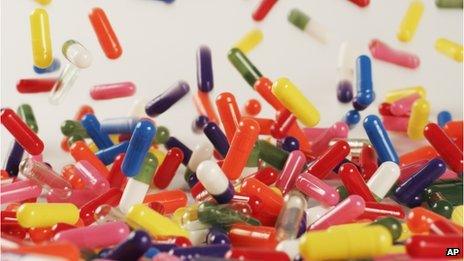Are you willing to swallow a recycled pill?
- Published
- comments

An estimated £300m of medicines are wasted in England each year
The NHS needs to save £20bn, so making ends meet is going to be tricky and big changes will be needed.
In this week's Scrubbing Up, Dr David Pencheon, director of the national NHS Sustainable Development Unit, says recycling medicine could be part of the answer.
The cuts facing the NHS are like you or I losing around 20% of our salary over the next three years - while trying to lead the same sort of lifestyle.
We'd have to make some big changes. And that's exactly what the NHS will have to do, particularly if it wants to keep improving the quality of patient care.
So what can it do? One positive change is for the NHS to become more sustainable, not just financially but also environmentally.
It's not difficult to be sustainable. In fact, at home it's quite natural. We recycle, we don't leave the taps running needlessly, we don't leave the TV, radio and the lights on when we go to work, or even when we pop out to get the paper from the newsagents.
We also don't throw away a packet of headache pills just because they have been opened.
But yet, when we go to work it can be a different story, with lights left on, windows opened rather than thermostats turned down and medicines wasted and put in the bin.
Public interest
NHS staff are no more wasteful than anybody else. But working in a high-pressure environment where lives can be on the line often means that waste isn't always at the top of the agenda.
Recently,we commissioned research, externallooking at ways of saving carbon, as well as money, across the NHS in England.
The results showed that energy efficiency with improved heating and lighting controls was one important way of saving cash, more than £7m a year.
However, the biggest financial and carbon savings came from reducing drugs wastage.
An estimated £300m of medicines are wasted each year in England, but around £89m could be saved by making a 2.5% reduction in medicines wastage.
That's a big saving. Of course we have to ensure the drugs are safe to be reused. But these problems can be solved.
The issue is not so much how we reuse drugs but rather whether the public want us to do it.
Are they willing to swallow the pill - in this instance a recycled pill?
When we polled 1,000 people, external, we found 52% would be likely to take pills that had been returned unused by other patients and checked for safety, while only 19% said they would be very unlikely to do so.
Carbon footprint
Combining financial sustainability with environmental sustainability is a win-win situation.
The carbon footprint of manufactured drugs, which are often shipped from the other side of the world, is huge - if these drugs can be recycled then so much the better.
In addition, medicines should be prescribed for shorter periods of times so people have fewer unused medicines in their cabinets, and we must put greater efforts into preventing illness rather than always worrying about curing it.
Most people prefer to be healthy and not have to go to hospital or see their GP.
So if the NHS spent more resources on illness prevention for diabetes, obesity, cancer and heart disease then less people would end up needing drugs.
That's better for the NHS and better for the public.
However, until we are in that position we need to consider other ways of making the NHS more sustainable.
The fact that the public are thinking more positively about recycling medicines should be welcomed. It shows that people have a great deal of faith in their health service, despite headlines to the contrary, and that they want to help the NHS become more cost effective and more sustainable.
Sustainability therefore must become core to the way the NHS operates and be part of every decision making process if it is to be truly fit for the future.